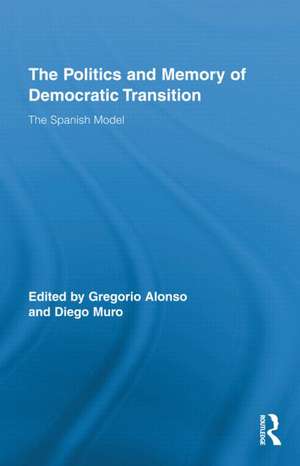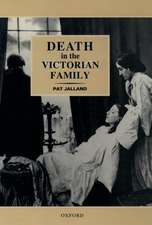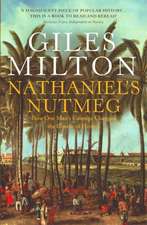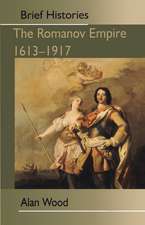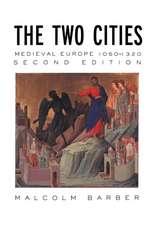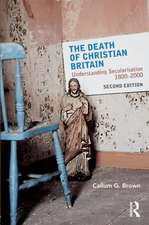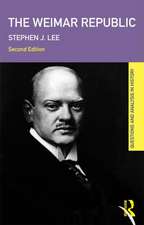The Politics and Memory of Democratic Transition: The Spanish Model: Routledge/Canada Blanch Studies on Contemporary Spain
Editat de Diego Muro, Gregorio Alonsoen Limba Engleză Hardback – 22 noi 2010
By making comparisons to other democratic transitions, synthesizing the ideas of several leading Spanish History scholars, as well as incorporating new voices involved in creating the directions of research to come, The Politics and Memory of Democratic Transition offers a thorough and vital look at this key period in contemporary Spanish history, taking stock of critical lessons to be gleaned from the Spanish Transition, and pointing the way toward its future as a democratic nation.
Din seria Routledge/Canada Blanch Studies on Contemporary Spain
-
 Preț: 350.83 lei
Preț: 350.83 lei - 8%
 Preț: 389.01 lei
Preț: 389.01 lei -
 Preț: 291.20 lei
Preț: 291.20 lei -
 Preț: 485.24 lei
Preț: 485.24 lei - 18%
 Preț: 1008.65 lei
Preț: 1008.65 lei -
 Preț: 430.37 lei
Preț: 430.37 lei - 17%
 Preț: 191.60 lei
Preț: 191.60 lei -
 Preț: 373.00 lei
Preț: 373.00 lei - 31%
 Preț: 767.47 lei
Preț: 767.47 lei -
 Preț: 412.37 lei
Preț: 412.37 lei - 18%
 Preț: 889.49 lei
Preț: 889.49 lei - 18%
 Preț: 1004.34 lei
Preț: 1004.34 lei - 18%
 Preț: 1111.55 lei
Preț: 1111.55 lei - 26%
 Preț: 818.52 lei
Preț: 818.52 lei -
 Preț: 483.33 lei
Preț: 483.33 lei - 28%
 Preț: 822.34 lei
Preț: 822.34 lei -
 Preț: 387.58 lei
Preț: 387.58 lei -
 Preț: 383.50 lei
Preț: 383.50 lei -
 Preț: 386.00 lei
Preț: 386.00 lei -
 Preț: 387.20 lei
Preț: 387.20 lei - 22%
 Preț: 352.95 lei
Preț: 352.95 lei - 21%
 Preț: 258.91 lei
Preț: 258.91 lei - 5%
 Preț: 415.26 lei
Preț: 415.26 lei - 18%
 Preț: 1012.27 lei
Preț: 1012.27 lei - 18%
 Preț: 1002.50 lei
Preț: 1002.50 lei -
 Preț: 414.32 lei
Preț: 414.32 lei - 18%
 Preț: 1004.55 lei
Preț: 1004.55 lei - 18%
 Preț: 1003.43 lei
Preț: 1003.43 lei -
 Preț: 450.87 lei
Preț: 450.87 lei - 18%
 Preț: 1054.71 lei
Preț: 1054.71 lei - 18%
 Preț: 1075.24 lei
Preț: 1075.24 lei - 25%
 Preț: 770.09 lei
Preț: 770.09 lei -
 Preț: 389.38 lei
Preț: 389.38 lei - 26%
 Preț: 821.13 lei
Preț: 821.13 lei
Preț: 1056.95 lei
Preț vechi: 1288.96 lei
-18% Nou
Puncte Express: 1585
Preț estimativ în valută:
202.24€ • 211.16$ • 167.38£
202.24€ • 211.16$ • 167.38£
Carte tipărită la comandă
Livrare economică 04-18 aprilie
Preluare comenzi: 021 569.72.76
Specificații
ISBN-13: 9780415997201
ISBN-10: 0415997208
Pagini: 298
Ilustrații: 10 tables and 10 halftones
Dimensiuni: 152 x 229 x 23 mm
Greutate: 0.52 kg
Ediția:1
Editura: Taylor & Francis
Colecția Routledge
Seria Routledge/Canada Blanch Studies on Contemporary Spain
Locul publicării:Oxford, United Kingdom
ISBN-10: 0415997208
Pagini: 298
Ilustrații: 10 tables and 10 halftones
Dimensiuni: 152 x 229 x 23 mm
Greutate: 0.52 kg
Ediția:1
Editura: Taylor & Francis
Colecția Routledge
Seria Routledge/Canada Blanch Studies on Contemporary Spain
Locul publicării:Oxford, United Kingdom
Public țintă
Postgraduate and UndergraduateCuprins
Introduction. Gregorio Alonso and Diego Muro Part I: Politics 1. The Spanish Model Revisited. Richard Gunther 2. The Selection of an Electoral System: Less Consensus, More Heresthetics. José Ramón Montero and Ignacio Lago 3. Interparty Consensus and Partisanship in Spain's Transition to Democracy. Bonnie N. Field Part II: Civil Society 4. Radicalism without Representation: On the Character of Social Movements in the Spanish Transition to Democracy. Pablo Sánchez León 5. Children of a Lesser God: The Political and the Pastoral Action of the Spanish Catholic Church. Gregorio Alonso Part III: Nationalism 6. Salvation by Betrayal: The Left and the Spanish Nation. Alejandro Quiroga 7. The Basque Experience of the Transition to Democracy. Diego Muro Part IV: Memory 8. ‘Pacto de Olvido’. Carsten Humlabaek 9.Cinema and Television in the Transition. Paul Julian Smith Part V: International Dimension 10. The Role of the EEC in the Spanish, Portuguese and Greek Transitions. José M. Magone 11. Democratizing Spain: Lessons for International Democratic Promotion. Omar Encarnación
Notă biografică
Gregorio Alonso is Lecturer of Spanish History at the University of Leeds, and has previously taught at King’s College London. He has published on politico-religious conflict and secularization in Modern Europe in journals and edited volumes. His monograph La ciudadanía católica y sus enemigos. La cuestión religiosa en España will be published in 2010.
Diego Muro is Assistant Professor in Comparative Politics at the Institut Barcelona d’Estudis Internacionals. Prior to joining IBEI, he was Lecturer in European Studies at King’s College, London. He is the author of Ethnicity and Violence: the Case of Radical Basque Nationalism (Routledge, 2008) and of various articles on nationalism, political violence, social movements and democratisation.
Diego Muro is Assistant Professor in Comparative Politics at the Institut Barcelona d’Estudis Internacionals. Prior to joining IBEI, he was Lecturer in European Studies at King’s College, London. He is the author of Ethnicity and Violence: the Case of Radical Basque Nationalism (Routledge, 2008) and of various articles on nationalism, political violence, social movements and democratisation.
Descriere
This collection of essays focuses on the social, political and cultural transformations witnessed in Spain in the late 1970s. By combining top-down and bottom-up approaches, the volume offers a renewed approach to the peaceful (re-)birth of Spanish democracy and to those actors and factors that made it possible.
